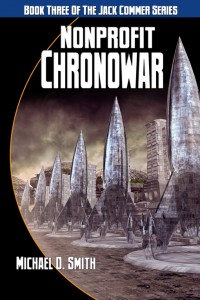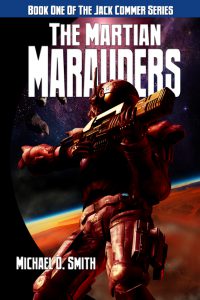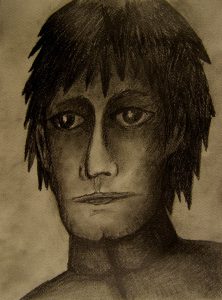Jack Commer Book Seven Interviews, 5: Jack Commer
Mike: And now we come to one of our most interesting and perhaps difficult interviews, with Jack Commer, Supreme Commander himself.
Jack: So what makes you think this will be a difficult interview?
Mike: Well, I guess we haven’t really talked in a long time.
Jack: You’ve got that right. December 1981, Part B of that weird “Zorexians” story. You know I wasn’t in my right mind at that time. Probably you weren’t, either!
Mike: Well, all that was experimental writing, trying to move beyond–
Jack: Well, it sure wasn’t my true character, that’s all I know. You were really searching for Joe’s character at the time, though none of us knew it until you got into writing Nonprofit Ladies. Have to admit the “Zorexians” story did us all some good. You really got into Joe, though at the time you thought it was Jack you were working on. It was a real wrench for me to have to play the Joe part with both of us thinking it was Jack, pathetically out of his mind with lust for another man’s wife, Jackie Vespertine. But even though she wasn’t interviewed, you sketched out a future Jackie pretty well. And while the spacecopter scene eventually got cut from Nonprofit Ladies by the time the book became Nonprofit Chronowar, it laid out the foundations of that novel and so it ultimately worked. And it deepened Joe’s character for The Martian Marauders revision and everything that followed.
Mike: Wow, I’m impressed at how quickly you took over this interview. I’d imagined you’d somehow be withdrawn and surly.
Jack: Well, I have to admit I’m ambivalent about doing this interview. Of course I have to be in Jack Commer Seven, but … hell, I don’t know. I guess the whole point of this interview is, what am I supposed to do in this novel? Rescue my son? Big deal! Does he even need rescuing?
Mike: I guess that’s what we’re here to find out. So far, except for a great Chapter One idea, the notes for the plot are pretty flat and plodding, I admit. I’m hoping that things will open up as I go along, but then again, it would be great to have some really fascinating plot sketched out that the characters can navigate.
Jack: Then there was all this crap in Book Six about how Amav and I were drifting apart, that we’d never really been able to talk about JJC’s kidnapping in ’38, and how decades later this is really screwing us up.
Mike: I more envisioned a sort of, I guess, tune-up for the marriage, not that there’s anything really wrong with it.
Jack: And somehow the search for our renegade son is supposed to fix everything? C’mon.
Mike: So–that wasn’t realistic at the end of The SolGrid Rebellion?
Jack: I don’t know. I admit it was thrilling to have Amav come right out and finally start talking about it in a way she never had before. There was a new force there, and that was great. Amav has always been nothing but force. Then again, why am I always portrayed as a little befuddled and cranky? Amav has to hit me over the head with her force two or three times before I pick up that she’s serious. I mean, I’m the Supreme Commander, I’ve been running everything for forty years, and I’m a bumbler?
Mike: I think the concept is that you represent some of the problems coming up with the new rejuvenation technologies in Sol–the last two books especially have hammered home the idea of hundreds if not thousands of young USSF officers waiting in line for their chance to come up a grade or two, while seventy-three-year-old Jack Commer sits at the top and never ages past thirty-five, and sometimes wonders why he’s still hanging around.
Jack: Yeah, I can see that and it bothers me. I’ve wanted to retire, but just can’t bring myself to. I tried to at the end of Book Six, but then Amav starts lecturing me about not putting myself into a museum! So there’s a lot of interesting stuff for me to do. What I really need is a long vacation to reassess all this. But from what I see from the notes so far, the vacation lasts about two hours before all this crap hits the fan with JJC.
Mike: In any case, I see we’re going to need to craft a real role for you in this novel, not just have you be some typical father searching for a lost son.
Jack: Exactly. Except that, for both Amav and me, JJC hasn’t ever really seemed like a son. Kidnapped in 2038 at eleven months, then we only see him as a five-year-old child in 2053 because of eleven years of time travel, then we only see him a couple more times until 2075, at which point he pulls that idiotic Emperor stunt at Procyon A, and he’s being disgusting and disrespectful and … I don’t know. How could we relate to that? Speaking for myself, I guess, how could I relate to that? There was no connection at all. He was a total stranger, and one I didn’t particularly like. On the other hand … there was a connection …
Mike: Okay, we can work on that. So how do you feel about this being the last Jack Commer novel? How does that affect your role in it?
 Jack: I’m not worried. We characters are always immortal, no matter whether the book is a series or a standalone novel. At some point you the author have to stop manipulating the same characters over and over. And you have so many characters in the series at this point that we can all see you testing which ones could come to the fore in the next. Like the way Laurie just emerged in The Wounded Frontier. Great stuff. But can she be expected to do that over and over and over? But I’m not worried. As for my part in a final novel, I recognize it needs to be important. Although I enjoyed my role as being almost completely offstage in Book Three, Nonprofit Chronowar, and I do think it worked there as that was Joe’s book, I realize I have to step up in this one and do something pretty significant. This may even be JJC’s book, the notes and the writing may lead there and I know he’s central and important, but–Jack Commer needs to do more than worry about retirement in this one. Also–and we all know this–we know you need to end the series and we all agree, even old Sam Hergs, but we all also know that you have the inclination to leave further books open. You don’t want to close doors. You don’t want a plot in Book Seven that precludes a return, if someday you want to do that.
Jack: I’m not worried. We characters are always immortal, no matter whether the book is a series or a standalone novel. At some point you the author have to stop manipulating the same characters over and over. And you have so many characters in the series at this point that we can all see you testing which ones could come to the fore in the next. Like the way Laurie just emerged in The Wounded Frontier. Great stuff. But can she be expected to do that over and over and over? But I’m not worried. As for my part in a final novel, I recognize it needs to be important. Although I enjoyed my role as being almost completely offstage in Book Three, Nonprofit Chronowar, and I do think it worked there as that was Joe’s book, I realize I have to step up in this one and do something pretty significant. This may even be JJC’s book, the notes and the writing may lead there and I know he’s central and important, but–Jack Commer needs to do more than worry about retirement in this one. Also–and we all know this–we know you need to end the series and we all agree, even old Sam Hergs, but we all also know that you have the inclination to leave further books open. You don’t want to close doors. You don’t want a plot in Book Seven that precludes a return, if someday you want to do that.
Mike: Right. Although I did have that dream recently where I write: “And Jack Commer shot his spaceship directly into the sun.” A good last line for Seven?
Jack: But we all know Jack will be shifting dimensions or something so he can’t really die. He can fly a one-man ship into the sun and come out on the other side just fine, we all know that. But back to the important thing: my character has been tepid the last couple novels. Yeah, I’m in command, I worry, and sometimes I get angry and bark orders, but all the action seems to revolve around me and I never make a real choice, you know. Just as Jack Commer as Supreme Commander has become a figurehead to Sol in 2076, he’s sort of become just a figurehead in this series, as well. Who is he, really? I have to admit I like the 2076 drawing of myself, that’s a decent picture of a rejuvenated guy at the top still looking for the next challenge. But aside from him enjoying looking at Amav’s fantastic tush at the end of SolGrid Rebellion, there doesn’t seem to be much spark in him. Don’t tell me that’s why you’re ending the series.
Mike: No. Really, no. What I want is to bring out the real Jack Commer, the one that’s been with me since childhood, and see what he can do for this final book.
Jack: Well, the four Commer brothers have been with you a long time. You remember the four identical plastic spacemen out of the batch of maybe fifteen you had in elementary school? The four were all the same mold, sort of walking and somewhat floating on a lunar surface. They were the brothers Jack, Joe, Jim, and John. They were all the Command Mold, but they weren’t really all identical, because one of the four was a bit lopsided. So the lopsided one was the Shadow you called John, the spastic, impulsive one who, even in your eighth grade first draft of The Martian Marauders, was destined to impulsively destroy the Typhoon I and kill not only himself and our brother Jim, but four other crewmates and friends aboard the Typhoon.
 Mike: Right, right. I wish I still had those spacemen! But you’re right about the Shadow. I had my outlandish villain Sam Hergs in the eighth grade version of Martian Marauders, but even then I knew he was over the top, and I played him as over the top in the adult version as well. But so often we create villains thinking they should embody some sort of evil or conflict, but they’re just an exaggeration, a straw man we think we need for the plot, and they’re never very successful. Whereas John came out as a real Shadow–very slightly in the eighth grade version, but surprisingly clear in the first 1987 attempt to rewrite Martian Marauders, even though that was only one chapter which I left sitting in a drawer for something like fifteen years. When I finally rewrote the book in the early 2000’s, I was pretty conscious that John represented a recurring person in my life I could never adequately deal with. There are several different flavors of John, but I keep meeting him. Sometimes I’m supposed to befriend him, which I do reluctantly, sometimes I just have to put up with him, sometimes I have to report to him!
Mike: Right, right. I wish I still had those spacemen! But you’re right about the Shadow. I had my outlandish villain Sam Hergs in the eighth grade version of Martian Marauders, but even then I knew he was over the top, and I played him as over the top in the adult version as well. But so often we create villains thinking they should embody some sort of evil or conflict, but they’re just an exaggeration, a straw man we think we need for the plot, and they’re never very successful. Whereas John came out as a real Shadow–very slightly in the eighth grade version, but surprisingly clear in the first 1987 attempt to rewrite Martian Marauders, even though that was only one chapter which I left sitting in a drawer for something like fifteen years. When I finally rewrote the book in the early 2000’s, I was pretty conscious that John represented a recurring person in my life I could never adequately deal with. There are several different flavors of John, but I keep meeting him. Sometimes I’m supposed to befriend him, which I do reluctantly, sometimes I just have to put up with him, sometimes I have to report to him!
Jack: Wow! Now there’s Shadow. I can see why you want to get back into some literary writing, so you can explore that real stuff instead of stock villains like Rick Ballard, who, by the way, I’m prepared to blast on Full Shatter if he sets foot in here today. That stuff about Amav–God! What a loser.
Mike: Anyway, and this is hard to admit, you obviously bear the burden of portraying some aspect of myself–which may be why I’ve been hesitant to get too far into your character.
Jack: Which is suicide for an author, you’ve got to admit! But to assuage your worries a bit, you did great with me in the first two books. Jack really has some worries, especially about being in command of a spaceship in battle for the first time, even though the year before he dropped an Xon bomb that wiped out two billion people. You explored Joe’s war guilt a lot in Book Three, but so far, not mine yet.
Mike: Yes, it’s probably about time for it.
Jack: But at any rate, you have a Jack so racked by John destroying the Typhoon that he’s ready to give up, to just die in space. Then you have him, a thirty-year-old virgin, a killer of billions, so shy he’s hardly able to talk to Amav Frankston! The contrast between him and Joe the ladies’ man is priceless. Then, in Jack Commer, Supreme Commander, the failure of his first mission as Supreme Commander, plus the Centaurian brainwashing going on around him, his still-adolescent sexuality even though he married the wondrous Amav Frankston, all combine to make him into the most whiny, petulant jerk you can imagine. And yet he pulls himself out of it. He realizes he’d sell the whole universe to save Amav. So Jack Commer gets some psychic integration here. He’s a real character.
Mike: Yes, thanks for reminding me. I think I must have been thinking that Jack Commer was more or less done, so when I was writing the first draft of Nonprofit Ladies and had switched you out for Joe so that we could explore his war guilt, I no longer needed you. Nonprofit Ladies was actually intended as a standalone book at first; at that time the first two books were in draft form and I really didn’t think much of either of them. Amazingly, in the first couple drafts of Nonprofit Ladies, later Chronowar, Jack is only mentioned a couple times in passing. It was only when I was getting into the final version, which came after November 2006’s realization that I was polluting my writing with vulgarity and unpublishable nonsense, that I knew Jack had to come back at the end of the book to start setting things straight. Even then he’s more of a contributor than a main character.
Jack: Right. But just because he integrated and assumed a more mature command status in Nonprofit Chronowar doesn’t mean his story is over. In Book Four, Collapse and Delusion, he’s in that zone of merely reacting to events around him. He’s decisive and even suffers a terrible injury, and we see something of his mature appreciation of Amav even when she’s brainwashed and behaving very, very badly with Phil Sperry, but again he seems kind of cranky and dazed. Maybe you’re right that it’s related to the rejuvenation thing and what that’s doing to society by 2076.
Mike: Well, Laurie starts echoing those sentiments in her initial appraisals of Jack in The Wounded Frontier, Book Five. Yet we see Jack striking out for more exploration. He’s making some real decisions in both Books Five and Six, but I see your point. By the end of Six he’s just simply stressed from everything happening from June 2075, Book Four, to April 2076, Book Six. So maybe we start off with the first day of his vacation making him question even a lot further than he’s ever dared question before.
Jack: Well, one thing for sure, it can be tempting to think that rejuvenation can make you immortal, but we just don’t know how far it can be extended. So now we have four hundred years maybe, so what? We still have our mortality. Everyone knows that accidents or serious illness, if not treated in time, can still kill anyone at any time. And we in the USSF figure that extending our lifespans just exposes us to more and more possibility of encountering the fatal spacecraft accident. We figure we’ll probably go out in style, then, not in a hospital bed. But it keeps us wary and focused. I don’t know of a single flying USSF officer–I won’t talk about the deskbound people–who doesn’t feel that way.
Mike: Well, this has all been very interesting, Jack. There’s a lot of work to do on all the characters, but especially you, I think.
Jack: Right. My old English teacher Amy will just write her own ticket. The rest of us, well, a lot of thinking needs to be done.
Rick Ballard: Is he gone yet? Amav’s up next and I–
Jack: Goddammit, I knew he’d show up! Well I wasn’t fooling when I said–
Mike: You didn’t bring your shattergun to an interview! Oh my God!
Ballard: Aw, the stupid twit wouldn’t dare–
Mike: Jack! No! Don’t do it! I need him for Chapter One! Holster it! That’s an order!
Sound: Shrieking of shattering glass
Ballard: AIEEEEEEEEEEE!
Mike: Crap! I’m the one who needs to clean that up!
Jack: Fine. Just keep him away from Amav. Was that enough action from old Jack for you there? Thanks for the interview, Mike. We’ll be in touch, I’m sure.
copyright 2018 by Michael D. Smith



Pingback:Presenting Balloon Ship Armageddon, or, Nine Astronauts Were Walking to a USSF Meeting, or, Jack Commer Shot his Spaceship Directly into the Sun – Sortmind Blog – Michael D. Smith